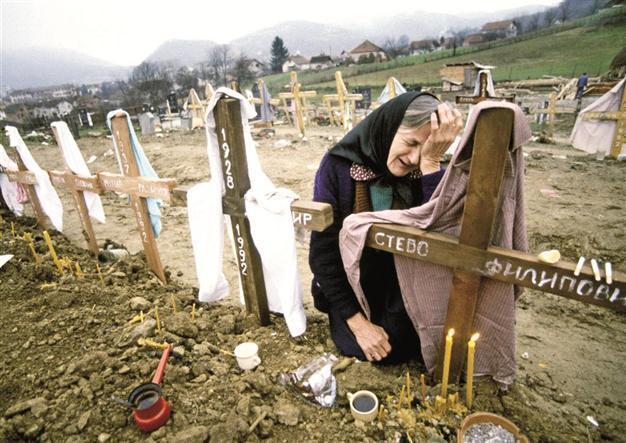French photo journalist Chauvel tells his life around photography, war and peace
ISTANBUL - Anatolia News Agency

Independent war photogpraher and photo journalist Chauvel says he admired painters rather than photographers. AA photos
Patrick Chauvel, a photo journalist known for his war photographs, told Anatolia news agency his stories of war and peace. These are two worlds, according to Chauvel. “There are two different lives for me.”
Chauvel told the story of a friend who went from Bagdad to his family in New York just because his daughter’s fish died. “My friend told his daughter the difference between death and life, and he adapted to the world of peace immediately. In fact he was coming from a world where people are dying for wars and in wards.”
It is easy for some people to adapt themselves to peace immediately. The events of daily life and living mean peace, he said.

Chauvel said he admired painters rather than photographers. In order to adapt himself to peace and the other world that he is living in, Chauvel shares his memories with his friends.
Chauvel said he needed to become a part of peace after his time in wars. “I have friends. I like to read books, philosophy and also music.”
Art helps him to adapt himself to normal life. “Art is life. I admire painters. Sometimes when I see a painter I think to myself, ‘How can a person create such beauty?’”
“That’s why I am going to the Louvre and feeding my soul with art,” said Chauvel, and added that when he returns to war he becomes stronger. “Some people are living in the dark all the time in war, and they know nothing but war.”
“You know there are gangs in South America. They are the children of war. They know nothing about the law. Even though the war ends, they will continue to kill for drugs, cars, money and so on,” said Chauvel, adding that war means the end of all law in the world.
“People who are stronger win everything and become king in the world of war.” History always tells the story of the winners, not the losers, and those who win decide the laws. “The weak, on the other hand, lose, and they need to obey.” Chauvel said countries that are poor are under siege and at war because they are weak. “In order to protect the country, one has to have a strong government and education. On the other hand, look at Lebanon. The government is very weak and corrupt, and the army was very weak. That’s why the civil war started there.”

“After all, everything has started. Palestine has separated from Jordan and Palestine started to have states within itself. The largest and the biggest were done by Jordan to Palestine. Palestine went to Jordan, but they did not have an army,” said Chauvel. The environment has gone into chaos.
There is a rule in war – it is always very easy to hold a war against a weak country, according to Chauvel.
Chauvel has been affected by the things he has seen in war. “When you look behind a camera, you feel like you are watching a movie. You put a wall between yourself and the things happening around you.”
“When you do it, the pain of the war seems to decrease,” he said, adding that when the wall does not exist – the wall might be perceived as the camera Chauvel uses – the things that he sees are hard to overcome and forget. When asked if was there any war that he wanted to go to but never did, Chauvel said: “I really wanted to go to the Turkey-Cyprus war. I came to Turkey and tried to pass to Cyprus, but I could not receive the necessary permissions.”
He has traveled the world to countries such as Vietnam, Cambodia, Eritrea, Ireland, Lebanon, Nicaragua, South Africa, El Salvador, Tahiti, Panama and many other countries witnessing wars around the world.
About Patrick Chauvel
Patrick Chauvel has been an independent war photographer since his youth. He has traveled to more than 20 conflicts all over the world, including the Six-Day War and the Vietnam War.
In 1989 during the invasion of Panama, he was critically wounded in the stomach by two rounds shot by Marines; Juan Antonio Rodriguez (El Pais) was killed. After the death of Princess Diana
of Wales he allegedly saw time-stamped photographs from a speed camera showing the Mercedes entering the fatal tunnel. He has also written books. Author of two books in French, the autobiographical “Rapporteur de Guerre” (2003) and the novel “Sky” (2005), Chauvel also participated in 24h.comneo media projects and in the Condition One project. He became a laureate of the prestigious World Press Photo Prize in 1995.

 Chauvel said he admired painters rather than photographers. In order to adapt himself to peace and the other world that he is living in, Chauvel shares his memories with his friends.
Chauvel said he admired painters rather than photographers. In order to adapt himself to peace and the other world that he is living in, Chauvel shares his memories with his friends.  “After all, everything has started. Palestine has separated from Jordan and Palestine started to have states within itself. The largest and the biggest were done by Jordan to Palestine. Palestine went to Jordan, but they did not have an army,” said Chauvel. The environment has gone into chaos.
“After all, everything has started. Palestine has separated from Jordan and Palestine started to have states within itself. The largest and the biggest were done by Jordan to Palestine. Palestine went to Jordan, but they did not have an army,” said Chauvel. The environment has gone into chaos.